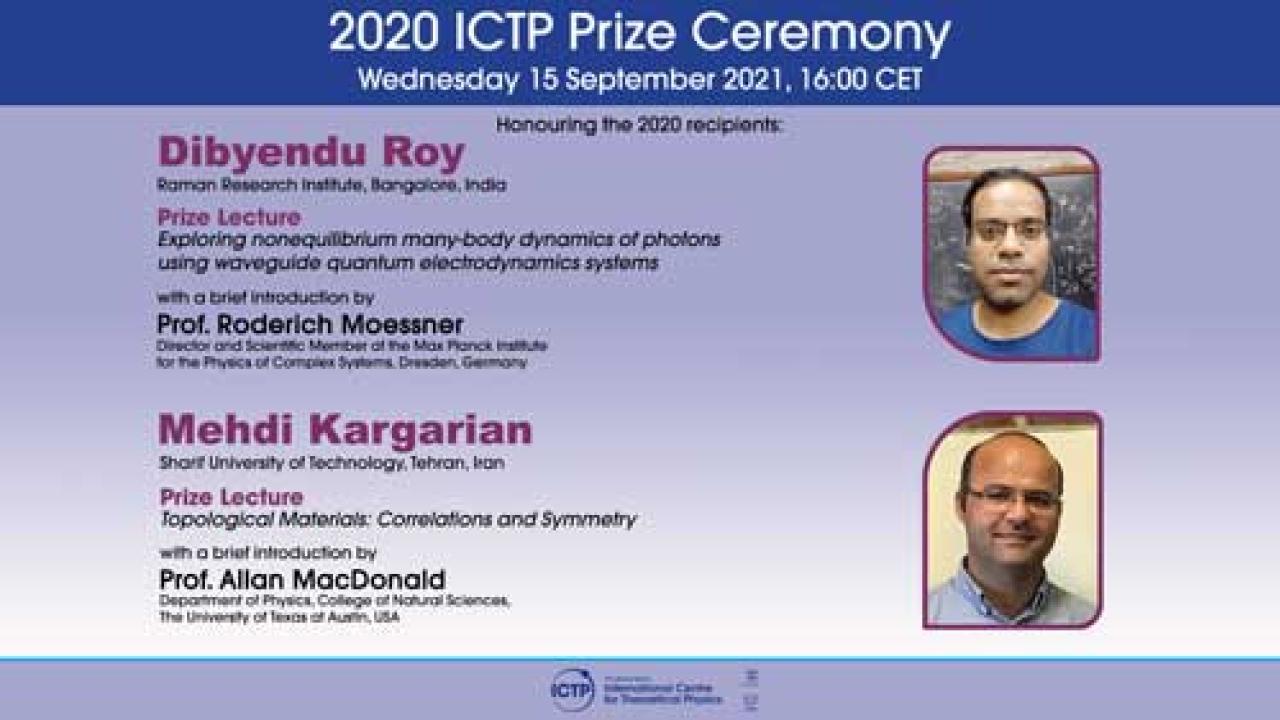
This year's ICTP Prize celebrates research into understanding the behaviour of matter. The institute is happy to award the Prize to Professors Dibyendu Roy and Mehdi Kargarian, who share it for their outstanding results in condensed matter physics.
The award ceremony, now in its 38th edition, will take place Wednesday September 15th at 16.00. After welcome remarks from ICTP Director Atish Dabholkar, the two scientists will be introduced by senior scientists in their fields, and give their own talks on the outstanding work being recognized by the Prize.
The ICTP Prize recognizes remarkable and original contributions to physics by young scientists from developing countries who are living and working there. Established in 1982, each year the Prize is given in honor of a scientist who has achieved extraordinary results in the same field as the year's awardees. The 2020 ICTP Prize is dedicated to the memory of David J. Thouless, who did vital research in topological phases of matter. He was awarded the Wolf Prize in 1990 and the Nobel prize in 2016.
The ceremony will be held online. Everyone is welcome to attend. For further information, please click here.
Roy and Kargarian both study the sometimes unusual properties of matter that emerge from the interactions between its composite atoms. Kargarian focuses on the properties known as topological phases of matter: “Topology is where the electrons organize themselves into patterns which remain robust against perturbations, much like deforming a sphere without piercing it,” he explains.
Roy’s work also focuses on how matter behaves when it is disturbed. He studies non-equilibrium properties of matter, looking at physical systems in unbalanced, transitory states. "Examples of these systems include the behaviour of transistors used in computers,” very common and fundamental electronic component, “when affected by electric currents" says Roy.
Dibyendu Roy is an Associate Professor at the Raman Research Institute, Bangalore, India. Roy develops theoretical descriptions for non-equilibrium systems as well as “exploring new exciting phenomena with potential practical applications.” He has proposed a sophisticated type of component for optical devices like lasers, a non-linear optical diode. His proposed component allows light to propagate in one direction and blocks it in the opposite direction. “This diode was recently experimentally realized,” says Roy, confirming the validity of his theoretical proposal. The device has numerous potential applications in industrial and laboratory settings.
Mehdi Kargarian, Assistant Professor at Sharif University of Technology, Tehran, Iran researches topological phases of matter and strongly correlated electrons. “In a nutshell, the underlying properties of materials emanate from the behaviour of electrons," explains Kargarian. "That behaviour is controlled by the electron-electron interaction, symmetries, the spin of electrons, and the recently-discovered concept known as quantum topology. When combined with strong electron interactions and symmetries, new and unprecedented phases of matter emerge out of this interplay.” His research group's research has uncovered new behaviours in commonly used materials. “We found that topology, symmetry, and strong electron interactions lead to new phases of matter in insulators and metals. The key question is, what are the organizing principles behind the properties of materials we observe in daily life such as insulators, metals, semiconductors, magnets, superconductors, etc?" Kargarian explains, "Understanding such principles paves the way to discover and design new materials with ambitious functionalities.”
Kargarian was absolutely thrilled seeing his work being recognized by the ICTP Prize selection committee:“This gave me lots of joy, enthusiasm, and hope.” Roy was also excited: “This recognition for my activities is highly encouraging, and it is an excellent boost to my research. I thank the Abdus Salam International Centre for Theoretical Physics for the prize a lot.”
---- Luca Papapietro













